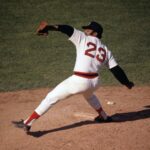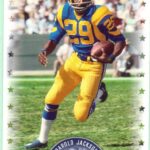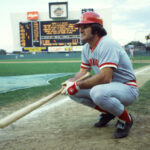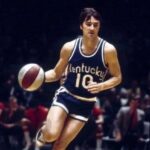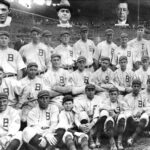Knuckleball Specialist Tim Wakefield Calls it a Career
The night was October 16, 2004 and a game, and another season was slipping away from the Boston Red Sox. Already trailing the New York Yankees two games to none in the American League Championship Series, the pitching in Game 3 was serving up batting practice fare to Yankee hitters. Tim Wakefield watched it unfold. He was scheduled to start Game 4, but stepped up and told manager Terry Francona that if need be, he (Wake) would give up his start and try and save the bullpen. Francona took him up on the offer.
Wakefield’s final line score showed that went 3 1/3 innings and gave up five runs in an 18-9 loss. A cynic might say his act of teamwork in giving up his start for a lost cause was pointless. But the innings he worked were the most of any Red Sox pitcher that night. It meant Francona got through the game without using Mike Timlin or Keith Foulke, while Alan Embree faced only a handful of batters. The core of the Sox bullpen was rested.
No one could have predicted what happened next. That not only would the Red Sox win the next four games in succession, but Games 4 & 5 would go a combined 26 innings, requiring every last bit of will from the bullpen and that Foulke would be needed again in Game 6, already running on fumes. But because Tim Wakefield put the interests of his team ahead of the interests of himself, even when it seemed like an act of futile martyrdom, the Red Sox were in position to pull off the miracle comeback. That’s why as he goes into retirement now, at age 45, that single act of selflessness should be his crowning memory.
It’s not as though the rest of his long career going back to 1992 was lacking in memories. Heck, it’s not as though the ’04 ALCS was lacking in memories. Wake was the winning pitcher in Game 5, pitching the 12th, 13th and 14th innings of that marathon. He won 200 games for his career, cleared the 15-win barrier four times, and was consistently over ten wins. Considering that most of his career was in the role of a third or fourth starter, those are the kind of steady numbers a championship team needs.
One of the most interesting things about Wakefield’s career is what might have been when it comes to postseason baseball. He made his major league debut in 1992 with a Pittsburgh Pirate team on its way to the National League Championship Series under the managing of Jim Leyland. Wakefield made 13 starts that year, and his floating knuckler got him an 8-1 record with a 2.15 ERA. He made his playoff debut in Game 3 of the NLCS. The series was getting away from Pittsburgh, as they’d dropped the first two games in Atlanta and Wakefield’s job was only to beat a future 300-game winner and surefire Hall of Famer in Tom Glavine. Wake threw a complete game and won 3-2. Three nights later he was again on the mound in a must-win spot, trailing three games to two and again facing Glavine. Wake got a lot of offensive help, but he pitched another complete game and won 13-4. He was poised to be MVP of the LCS the following night when Pittsburgh led 2-0 after eight innings, but Atlanta’s three-run rally in the ninth robbed him of the honor and a trip to the World Series.
If fate was cruel to Wakefield in 1992 it was positively vicious in the 2003 American League Championship Series. After a draining Division Series win over Oakland in five games, Wakefield got the ball to face the Yankees and Mike Mussina in Game 1 at the Bronx. Boston won 6-2. They lost the next two games and were facing a do-or-die spot when the Wakefield-Mussina rematch took place in Game 4. Again, Wake did the job, going seven innings and winning 3-2. When Boston was five outs from a pennant in Game 7, Wakefield again stood poised to be ALCS MVP—though second baseman Tod Walker would have had a case of his own. Another three-run rally did took it away and the game went extra innings.
Wakefield came on in relief. He pitched a scoreless tenth, but in the 11th, gave up the fatal home run to Aaron Boone. The handling of the pitching staff by manager Grady Little has been the subject of occasional conversation in Red Sox Nation since (please note sarcasm). I’ve always felt that too much focuses on Little’s decision to stick with Pedro Martinez in the eighth inning. I think it’s more worth noting that leaving a knuckerballer like Wake on the mound in a situation where one swing can beat you invites problems, especially when Scott Williamson was still in the bullpen. In his worst moment, Wakefield was in a situation not ideally suited to his strengths, which is steadiness over the long haul.
Steadiness over the long haul ultimately defined Tim Wakefield as a player and as a person. He gave back to the community. He gave to his team. So maybe it in the end, it is appropriate that the greatest moment of his career came not in being the MVP of the 1992 or 2003 LCS, but on a night where he gave up five runs in 3 1/3, but set the stage for something much larger.



